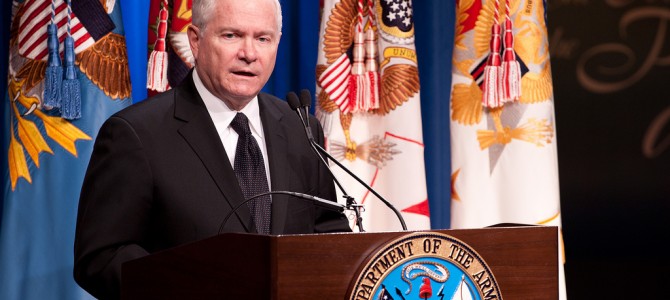
Robert Gates’ latest book, Passion for Leadership: Lessons on Change and Reform from Fifty Years of Public Service, could serve as an operational manual for the next administration. Unlike his previous books, From the Shadows and Duty, Passion for Leadership is at its heart a guidebook for managers in government, academia, and business, providing step-by-step advice for directing and reforming bureaucracies.
Gates walks the reader through the signature reforms accomplished throughout his career, sharing his successful (and occasionally unsuccessful) attempts to achieve major change. Much of his advice for managing bureaucracies is to be expected – listen to your staff, construct a vision for reform with metrics for success, and respect stakeholders and legislators.
Gates’ long career in every layer of the bureaucracy clearly shapes his perspective and attitude towards the federal workforce. While Gates emphasizes the need to move or fire senior officials (something he did with Army and Air Force leadership during his time as secretary) that are roadblocks for reform, treating career civilians and military colleagues with respect is a repeated refrain.
Pride in Public Service
Gates’ commitment to maintaining the “pride in public service and sacrifice” of the federal workforce is unique, especially in Washington, where reforming an agency is often synonymous with rejecting the usefulness and commitment of its employees writ large. This approach absolutely contributes to Gates’s legacy – he is revered by many in the major bureaucracies he led (full disclosure, I was a junior member of Secretary Gates’s personal staff for most of his tenure at the Pentagon, so I am personally familiar with the loyalty Gates inspired during his time in public service).
According to Gates, leaders don’t need to vilify their staff or “shake things up” to enact change, but instead should use targeted staff changes and clear terms for success to get the bureaucracy behind most reforms. When the bureaucracy won’t budge, Gates encourages leaders to act on their own, and circumvent the process on crucial time-sensitive issues. Gates cites his efforts to drive mass production of MRAPs and reduce the medivac time for service members wounded in Afghanistan as examples of how this is possible, even in government.
The book is largely missing what has become Gates’ signature sharp-tongued criticism of colleagues and adversaries alike. Bad managers from his career are often left nameless (with the notable exception of just about everyone involved in the political management of Texas A&M), and those he considered skilled managers receive praise by name. While Congress and other stakeholders get criticism for being shortsighted, Gates is quick to remind the reader that legislators are “the peoples’ representatives, and for that reason alone, warrant a leader’s respect and deference, however hard that sometimes is.” He remarks humorously that he worked so hard to maintain positive relationships with Congress that his harsh words in Duty caught his colleagues on Capitol Hill by surprise.
Bureaucratic Failures As Opportunities
Passion for Leadership is not a tome of political opinion. Gates uses this book to make what has become his refrain of “national interest over party interest” as a champion for bipartisanship, but this is not his main focus. While he repeats harsh criticism for budget sequestration, calling across-the-board cuts “managerial cowardice,” Gates also encourages leaders to use bureaucratic failures and budget crises as an opportunity for reform. He calls periods of tight budgets “unparalleled opportunities for reform leaders to implement changes in bureaucracy,” and encourages future leaders to take advantage of the “cold-shower reality of fewer dollars.”
Conservatives looking for ammunition to disassemble the fourth branch of government will be disappointed in Passion for Leadership. Whatever his personal convictions may be about the size of government, Gates’ focus in this book is working with what you have. He is not a legislator proposing reform. Instead, Gates offers a strong argument for navigating the bureaucracy as it stands, and maintains that a successful leader will have to do just that, even during institutional reform.
Future presidents hoping for institutional reform would be wise to keep Gates on speed dial. With a long season of budget constraints ahead, Passion for Leadership offers tools for reform to new managers, and should be required reading for staff in the next administration, particularly policy experts with little management experience. It’s equally applicable to military officers and ambitious staffers in any level of government. I’ve already assigned this book as required reading to my oldest daughter (sorry, Rebekah), a first-year ROTC cadet at the University of Virginia.
Overall, Passion for Leadership champions inspiring those in federal service, and harnessing the ideals and love of mission to accomplish monumental reform. Perhaps it is his background as an intelligence officer—where “adaptability is critical” to accomplishing the mission—that allows Gates to admit the mission is never done, and he left many reforms to the next generation of leaders. But Gates encourages that next generation to choose public service, and gives them tools to achieve future reform.









